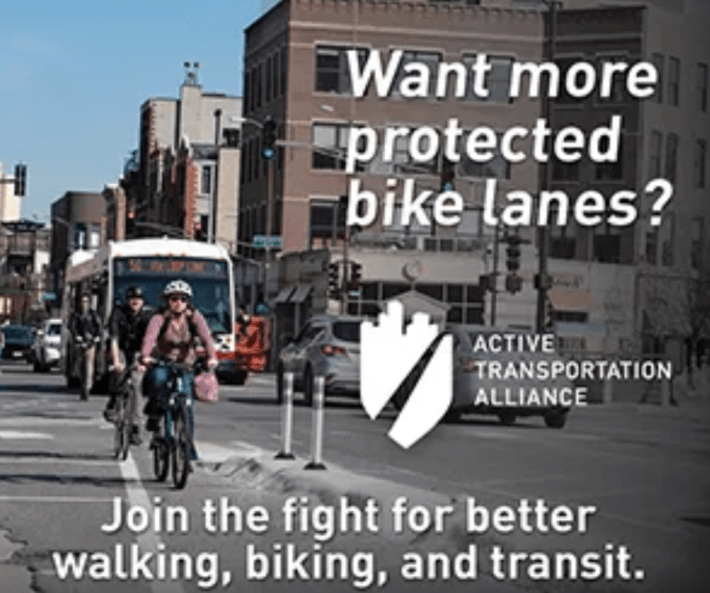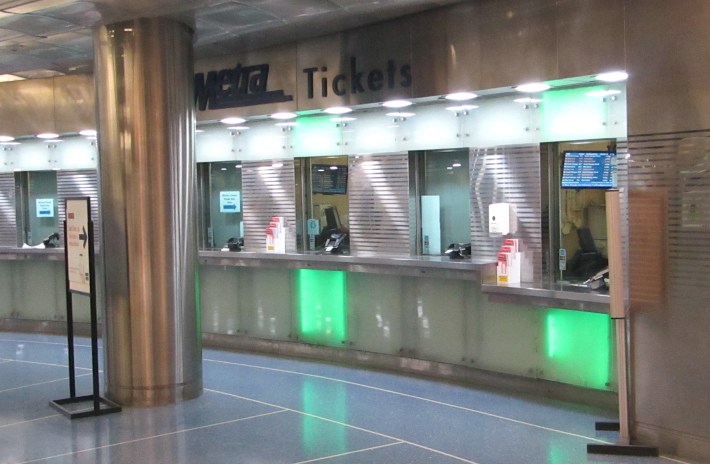
Update 1/10/23, 11:00 AM: When Metra closes all its ticket windows on February 1, customers will be required to pay all fares using a ticket machine, the Ventra app, or an onboard payment to a conductor. The latter currently requires a $5 surcharge if the customer entered at a station where a vending machine was available, on almost all lines. The exception is the BNSF route to Naperville and Aurora, where the ticket counters were closed last Monday, and the surcharge is temporarily waived.
Metra spokesperson Michael Gillis confirmed that the onboard payment surcharge with be temporarily waived on all Metra lines when the remaining ticket counters are closed next month. But he didn't have info on how long that grace period would last. "We said we’d waive it when we transition to our new structure on February 1, at least during the early weeks of the transition. We didn’t set a time."
When Metra announced its biggest fare overhaul in decades, the commuter railroad gave no indication that it would change anything about where riders can buy tickets.
But on January 3, Metra announced that all BNSF Line station ticket windows would close today, Monday, January 8, and the remaining ticket windows will close on February 1, when the new fare system will take effect. While the announcement came largely out of the blue, there was some foreshadowing. Over the past few years, Metra made it clear that it wanted to shift away from conductors and ticket agents selling tickets in favor of Ventra app purchases and ticket machines. A growing number of suburban station ticket offices has been closing, and the railroad has been quietly adding ticket machines on the BNSF Line, its busiest line, which serves Naperville and Aurora.
Metra spokesperson Michael Gillis told Streetsblog that the decision came about because the railroad needed to replace the ticket windows' aging credit card readers. They decided that this situation would be a good opportunity to pull the trigger on closing the booths. Monthly passes will be sold in vending machines, and riders who are eligible for reduced fares will be able to buy discounted tickets and passes from vending machines as well. They will just need to show their RTA reduced fare permits when conductors come by to check the tickets.
As of January 5, most Metra stations still didn’t have vending machines. Metra indicated that their goal is to put vending machines at all stations this year, but they didn’t give any more details.
According to the November 2023 Metra ridership trends report – the most recent report available – ticket agents currently only account for eight percent of ticket sales. Conductors account for another eight percent, ticket machines account for two percent, and the Ventra app accounts for an impressive 81 percent of ticket sales.
Metra currently has ticket agents at all four of its downtown terminals – the Ogilvie Center, Union Station, Millenium Station, and LaSalle Station – plus the Metra Electric District line’s Van Buren station. Gillis said that, in addition to those five stations, Metra has ticket windows at 41 stations throughout the system.

Since BNSF Railway operates the BNSF Line under a contract with Metra, the ticket agents on that line work for BNSF rather than Metra. The three Union Pacific Metra lines are currently transitioning from being operated by the Union Pacific Railroad under contract to being operated by Metra. (Ongoing friction between Metra and Union Pacific came to a head during COVID-19, when UP refused to have its conductors collect Metra fares.) Many UP employees working on those lines have already become Metra employees.
Gillis said "No jobs are being eliminated" because of the ticket windows closing, at least on Metra’s end. "We are repurposing some of the ticket agents as customer service representatives to help customers use the machines and to provide other travel information."
The last few Metra capital project plans included more funding for vending machines, and ticket windows have been closing on Union Pacific-, BNSF-, and Metra-operated stations one by one. Gillis said there were several factors that made them decide to make the ticket counters go the way of the dodo bird.
"The current point-of-sale credit card machines at our 46 staffed stations are nearing the end of their useful life and would have had to be replaced at great cost," he said. "We decided it made more sense to invest that money in vending machines, because vending machines are available at all times – unlike agents, who are generally only available in the morning rush periods. This also give us the opportunity to extend purchasing options by installing machines in additional stations that do not currently have agents."
Gillis added that Metra "started vending machine installation on the BNSF Line first because that line had a greater number of high-volume stations."
According to the commuter railroad’s official list of ticket machine locations, Metra has ticket machines on six out of 11 lines – BNSF, MED, Rock Island District, Union Pacific North, Union Pacific Northwest, and Milwaukee District West. If one doesn’t count the Loop terminals, BSNF Line currently has them at eight stations, while the other lines have them at two or three stations. As Gillis indicated, the priority seems to be on busier stations.
It should be noted that the MED line had ticket machines at every station all the way until April 30, 2017. Those machines, which, unlike the new ones, were cash-only, were holdovers from when the line had turnstiles, which were discontinued in 2004. At the time, Metra said that their use has been declining and removing them would reduce administrative costs.
The changeover will have an immediate effect on seniors and people with disabilities who have RTA reduced fare permits and buy physical tickets. In order to get a discount, they currently have to show the permit to a ticket agent or a conductor. "Reduced fare tickets will be sold from vending machines, and those using the tickets will be asked to show their permit or ID when using the ticket," Gillis said.

Did you appreciate this post? Please consider making a tax-deductible donation.





